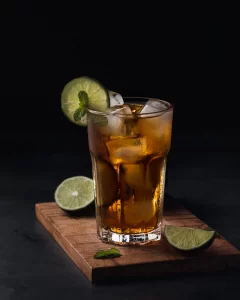Arizona Liquor Laws And Regulations
As with pretty much the rest of America, the legal drinking age in the state of Arizona is 21. However, those under the age of 21 can be in a bar but must be accompanied by a guardian, parent, or spouse who is aged 21 or over.
There are certain laws and regulations for those businesses selling alcohol in the state as they cannot conduct drinking contests or offer an unlimited amount of drinks for a set amount of time at a set price. There are also restrictions for businesses selling alcoholic beverages at a more general level.
In this guide, we will detail the liquor laws and regulations in Arizona.
General Liquor Laws And Regulations

The state of Arizona is a dry one, certainly for those aged under the age of 21. That sense of duty and discipline starts early as the liquor laws in Arizona prohibit parents from even teaching their children about how to drink in moderation.
Such teachings will not just be discouraged but they will be considered a criminal act. It is illegal for anyone under the age of 21 to drive with any alcohol present in their systems and using a false ID to purchase alcohol is also a criminal act.
The liquor laws in Arizona permit any adult above the age of 19 to tend bar or serve alcohol. What may seem strange is that 16-year-olds can sell alcohol in a store, like a grocery store, to appropriately aged individuals as long as it is for off-premises consumption.
However, a supervisor must be on the premises at all times and that supervisor must be over the age of 19.
The license fees for the state do vary, one is required of each type in counties with a population under 100,000 people. That shifts to three licenses for counties between 100,000 and 500,000 people.
Similarly, it is five licenses for counties with a population between 500,000 and 1,000,000 people and ten for those counties with more than 1,000,000 in their population.
Arizona’s Liquor Laws And Requirements For Selling Alcohol
The liquor laws and requirements for businesses licensed to sell alcohol to customers are relatively straightforward. Those businesses can serve alcohol all the way from 6am to 2am seven days a week but drinking is not allowed beyond 2.30am.
Customers cannot have alcohol in an open container between the hours of 2.30am and 6am.
Those that are intoxicated can stay in a bar for half an hour once the owner, or an employee, notices their intoxication and that time is to allow for sober transportation to be arranged.
One further requirement is that the store can sell alcohol but it must primarily sell other items. An individual can only be served a maximum of 50oz of beer, a liter of wine, or 4oz of spirits for their own consumption at any given time.
Arizona’s Liquor Laws And Requirements For Buying Alcohol
One violation of Arizona’s liquor laws is for a visibly intoxicated individual to buy, or even try to buy, alcohol. It’s also a violation for such an individual to consume alcohol in a business that has an alcohol license.
Other violations included in the purchase of alcohol include using a false ID to buy, or try to buy, alcohol. The penalties are significant for anyone doing so under the age of 21 as they would be guilty of a misdemeanor in Class 3 which could result in imprisonment.
The violations also include those who carry firearms as they cannot legally carry one into a business that is licensed to sell alcohol. Strangely, individuals will likely not be arrested for offenses akin to public intoxication or public drunkenness.
Though it will be a violation of the liquor laws in the state should anyone be caught drinking alcohol in a public street, place, or gathering.
However, any resident in the state of Arizona can order up to a total of six cases of wine on an annual basis, that’s from any American winery that comes with a state permit.
Arizona’s Liquor Laws And Requirements For Driving

The liquor laws and requirements associated with driving are something to bear in mind. The laws do not require a blood alcohol concentration test to convict for a driving under the influence offense.
Instead, all that is required is for an officer to suspect that the driver has their ability to drive impaired to even the ‘slightest degree’ due to the consumption of drugs and/or alcohol.
Though the conviction may seem spurious it is certainly serious as the penalties can include a driving license being suspended, a mandatory ignition interlock device being installed, and even jail time.
Fines can amount to thousands of dollars, along with expenses and fees such as the installation of an ignition interlock device costing around $1,500. Probation is possible too, as is community service.
Licensing Requirements/Distillery Restrictions
If you are creating your own liquor like wine, beer, or distilled spirits, you will need to know the licensing requirements and distillery restrictions. You can give away your homemade liquor to those aged 21 and over without requiring a license.
A liquor license is required for the sale or resale of homemade liquor which includes its production, bottling, and storing. In a lot of cases, liquor licenses are required at a local, state, and federal level.
Final Thoughts
Arizona is a dry state so there are some liquor laws and regulations to consider. One of the most important concerns driving under the influence as a police officer only needs to suspect that alcohol is in an individual’s system.
That they do not need to perform a blood alcohol concentration may seem spurious but it is worth bearing in mind that there are considerations for how intoxicated an individual can be.
Beyond a mere conviction for drinking while being influenced by alcohol, there is also Extreme DUI and Super-Extreme DUI which come with their own penalties.
Frequently Asked Questions
What Is Considered As Extreme DUI?
Under the liquor laws and regulations of the state of Arizona, Extreme DUI (driving under the influence) relates to a blood alcohol concentration level of above 0.15% and below 0.2%.
Serious penalties can be expected for anyone convicted of Extreme DUI including jail for 30 days, an ignition interlock device being installed and a license suspension for 90 days. Associated fees and fines that come with extreme DUI can go beyond $3,000.
What Is Considered As Super-Extreme DUI?
For those with a blood alcohol concentration level at or above 0.2% when found to be driving can expect an exceedingly strong penalty. That could be jail for up to 45 days, having their license suspended for 90 days, as well as installation of an ignition interlock device.
The accumulated costs of the fines, fees, and expenses can go beyond $6,000.









